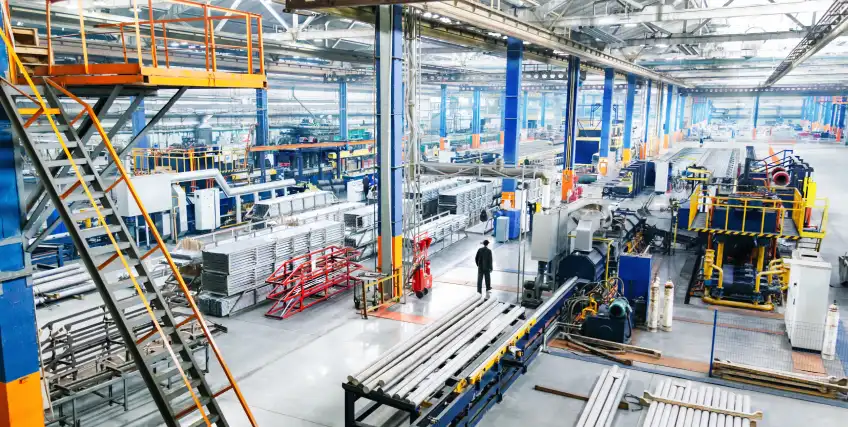Ultimate Guide to a Loan for Manufacturing Industry
July 04, 2025 | Last Updated on: July 07, 2025

Economic development relies deeply on the manufacturing industry. It has been a cornerstone to the US economy for hundreds of years. Building and scaling a manufacturing operation can require a substantial capital investment — everything from machinery and raw materials to expanding production facilities will need to be purchased. This is where a business loan for manufacturing industry can play a pivotal role.
This loan for manufacturing industry guide provides an overview of financing options for businesses, including types of loans, eligibility criteria, application procedures, and tips for securing funding.
Importance of Loans for Manufacturing Industry
Upfront capital for getting manufacturing businesses up and running can be costly. Some of the expensive expenditures can include:
- Machinery purchases or upgrades
- Factory or commercial real estate purchases
- Workforce payroll
- Working capital
- Cash flow
- Technology and automation
Because of these costs, manufacturers often require loans to maintain liquidity, ensure operational continuity, or pursue expansion plans.
Types of Loans for Manufacturing Industry
A. Term Loans
Definition: A term loan is a lump-sum amount with a fixed repayment schedule over a set period of time that is predetermined in the contract. These loans for manufacturing industry are typically used for large capital expenditures.
- Purpose: Purchase machinery, upgrades, or commercial property
- Duration: Varies
- Interest Rates: Fixed or floating
- Collateral: Usually required
B. Working Capital Loans
Definition: Working capital loans are short-term and created to offer coverage for operational expenses like staffing, rent, and utilities.
- Purpose: Day-to-day operations
- Duration: Varies
- Collateral: Sometimes unsecured
- Repayment: Monthly, quarterly, or based on cash flow
C. Equipment Financing
Definition: Equipment financing is a loan or lease used to acquire manufacturing machinery or make technology purchases or upgrades.
- Advantages: Collateral is often the purchase itself
- Duration: Varies
- Special Feature: Faster approval than traditional loans due to the collateral being a tangible asset
D. Line of Credit (LOC)
Definition: Line of credit is a flexible credit operation where you can withdraw funds as needed up to a verified amount.
- Benefits: Cash flow
- Interest: Pay only on the borrowed amount
- Ideal For: Seasonal manufacturing industries or those with fluctuating orders
E. Government-Backed Loans
Definition: Government-backed loans have partial guarantees or subsidies from the government to promote manufacturing growth.
- Benefits:
- Possible lower interest rates
- Flexible eligibility criteria
- Accommodating for women, SC/ST entrepreneurs, and SMEs
F. Trade Credit and Supplier Financing
Definition: Trade credit and supplier financing are short-term credit options from suppliers or vendors. These are often interest-free and for a specified amount of time.
- Benefits: Purchasing raw materials or goods
- Useful For: Managing supply chain without liquidity issues
G. Invoice Financing / Factoring
Definition: Invoice financing loans are secured by outstanding invoices.
- Benefits: Unlocking cash tied up in accounts receivable
- Advantage: Fast cash flow without waiting for customer payments
Criteria for Loan for Manufacturing Industry
Each financial lender may have its own criteria for a loan for manufacturing industry. However, there are general requirements for most loans that follow the same eligibility patterns. They include:
- Minimum business age of one to three years in operation
- Organized turnover or financial records
- Good business score and proper credit history
- Proof of profitability or positive net cash flow
- Proof of a registered entity, LLP, or LLC
If these requirements are hard to obtain, there are other routes for getting a loan for manufacturing industry. Startups can explore alternative lending or government schemes as other options.
Required Documentation for Loans for Manufacturing Industry
A comprehensive documentation package will ensure faster processing of your loan for manufacturing industry. These documents include:
- Business Proof:
- Certificate of incorporation
- GST registration
- Factory license
- Financial Records:
- Audited balance sheets and P&L
- Income tax returns
- Bank statements
- KYC Documents:
- PAN and Aadhaar (India) or EIN and SSN (U.S.)
- Director/partner identity and address proofs
- Loan Proposal:
- Purpose of the loan
- Business plan or project report
- Cash flow goals
- Collateral Papers (if applicable):
- Land title documents
- Machinery valuation reports
Steps to Apply for a Loan for Manufacturing Industry
Step 1: What are your Business Needs?
In order to get the right loan for manufacturing industry, you need to make some plans ahead of time. For instance, determine the loan amount required and what exactly the purpose of the loan is for. Consider whether short-term or long-term funding will work best for you.
Step 2: Who is the Right Lender?
Do you have eligibility with traditional banks or will you need to look at other options for how you get approved for a loan for manufacturing industry? Consider these lending options:
- Nationalized and private banks
- Non-banking financial companies (NBFCs)
- Microfinance institutions
- Online lending platforms
- Government credit schemes
Step 3: Organize your Documents
Have all your necessary documents and financials prepared ahead of time. Ensure all your records are up to date to avoid delays in getting a loan for manufacturing industry.
Step 4: Application Submission
Submit your application for a loan for manufacturing industry online or at a branch. Online platforms often have faster turnaround times and pre-approval options.
Step 5: Evaluation and Approval
After your application submission, lenders will evaluate the following aspects of your loan request:
- Creditworthiness
- Collateral (if any)
- Business stability
- Repayment history
If you get approved, you will receive an offer for the loan that details the amount, interest, tenure, and repayment terms.
Step 6: Disbursing of Funds
After you sign the agreement, funds will be disbursed to your business account. Make sure you’re aware and tracking the disbursement dates and repayment planning.
Risks for Loan for Manufacturing Industry
- Over Borrowing: If you take on too much debt, it can strain cash flow. Be sure to always balance debt with revenue projections so that you can stay on top of your financial intake and output.
- Market Fluctuations: Uncertainty around the market can be risky. Changes in raw material pricing and regulatory changes can affect your ability to repay your loan.
- Asset Seizure: If the business defaults, your assets are at risk of being taken by the financial lender.
- Inaccurate Documentation: Incomplete or inaccurate documentation can lead to delays or even rejection of the loan for manufacturing industry.
Steps to Get Approved for a Loan for Manufacturing Industry
- Regular Audits: Maintain clean records so that lenders can assess your business better.
- Good Credit Score: Pay off dues on time and reduce credit liability.
- Start Small: Consider applying for smaller loans in order to build credit history before applying for large loans.
- Keep Collateral: Owning valuable assets can improve interest rate options.
- Financial Advisor: Get a financial advisor to help with creating proposals, choosing lenders, and negotiating terms.
Non-Traditional Loans
In case traditional financing isn’t an option for you, there are alternatives to traditional loans for manufacturing industry. Here are a few to consider:
- Equity Financing: Share ownership of your business in exchange for capital
- Crowdfunding: Raise funds from public investors online
- Angel Investors / Venture Capital: Innovative manufacturing startups have found raising money through this investment option
- Leasing: Consider leasing equipment or real estate as a more financially secure opportunity
Financing Manufacturing Equipment
Manufacturing equipment is often one of the most capital-intensive steps for any production-based business. Consider financing equipment to help preserve cash flow while increasing productivity and business output. Here are a few reasons why financing manufacturing equipment might be a better option than purchasing equipment outright:
- Keep Cash Flow: Expensive upfront purchases can deplete your reserves.
- Tax Benefits: Depreciation and interest payments are often deductible.
- Faster ROI: You’ll have access to equipment quickly, which means a faster production turnaround.
- New Tech Capabilities: Financing can give you access to upgrades to advanced machinery without waiting.
SBA Manufacturing Loans
The U.S. Small Business Administration (SBA) supports small manufacturers through several structured loan programs. SBA manufacturing loans are created to fund competitiveness, export potential opportunities, and give access to capital.
Here are types of SBA Manufacturing loans to consider:
SBA 7(a) Loan for Manufacturers
The SBA 7(a) is the most common and widely used SBA loan.
- Maximum Loan Amount: $5 million
- Use Cases:
- Purchase equipment or machinery
- Expand manufacturing space
- Working capital
- Refinancing existing debt
- Collateral: Required for loans above $25,000
Ideal For:
- Small manufacturers who need to grow capital
- Companies with strong business plans and have been in operation for at least two years
SBA 504 Loan Program
The SBA 504 loan is specific for purchasing real estate, equipment, or machinery.
Ideal For:
- Manufacturers who are looking to buy or renovate a factory
- Businesses that are acquiring machinery at a high cost
SBA Microloans
SBA Microloans are smaller in scale, but they can help new or smaller manufacturers. SBA microloans are often administered through local non-profits that can also mentor and provide business guidance.
- Loan Limit: Up to $50,000
- Average Loan Size: $13,000
Ideal for:
- Purchase small tools or inventory
- Pay for training or startup costs
SBA Manufacturing Loan Requirements
SBA loans often take longer to get approved, but offer lower interest and longer terms. Here are some requirements that are necessary to get considered for an SBA manufacturing business loan:
- Must be a for-profit U.S. business
- Must meet the SBA’s small business size standards
- Must show repayment ability
- Proof of good credit
- Must avoid nefarious activities (e.g., speculation, gambling, etc.)
Final Thoughts on Loans for Manufacturing Industry
With the proper financing, a manufacturing business can go from a modest operation to an industry leader. Regardless of the size of your undertaking, it is imperative to understand the types of loans for manufacturing industry you need, how you can qualify, and what the terms of any agreement are in order to maintain financial stability through the growth of your business.
FAQs about Loans for Manufacturing Industry
Is equipment financing a good option for a loan for manufacturing?
Equipment financing can be used to acquire manufacturing machinery or make technology purchases or upgrades.
What is invoice financing?
Invoice financing loans are secured by outstanding invoices from customers. You get paid quickly even if your customers haven’t paid yet.
What is a term loan?
A term loan is a lump-sum amount with a fixed repayment schedule over a set period of time that is predetermined in the contract. These loans are typically used for large capital expenditures.
How can a financial advisor help with a loan for manufacturing industry?
A financial advisor can help with creating proposals, choosing lenders, and negotiating terms in your loan contract.
What are working capital loans?
Working capital loans are short-term and created to offer coverage for operational expenses like staffing, rent, and utilities.




